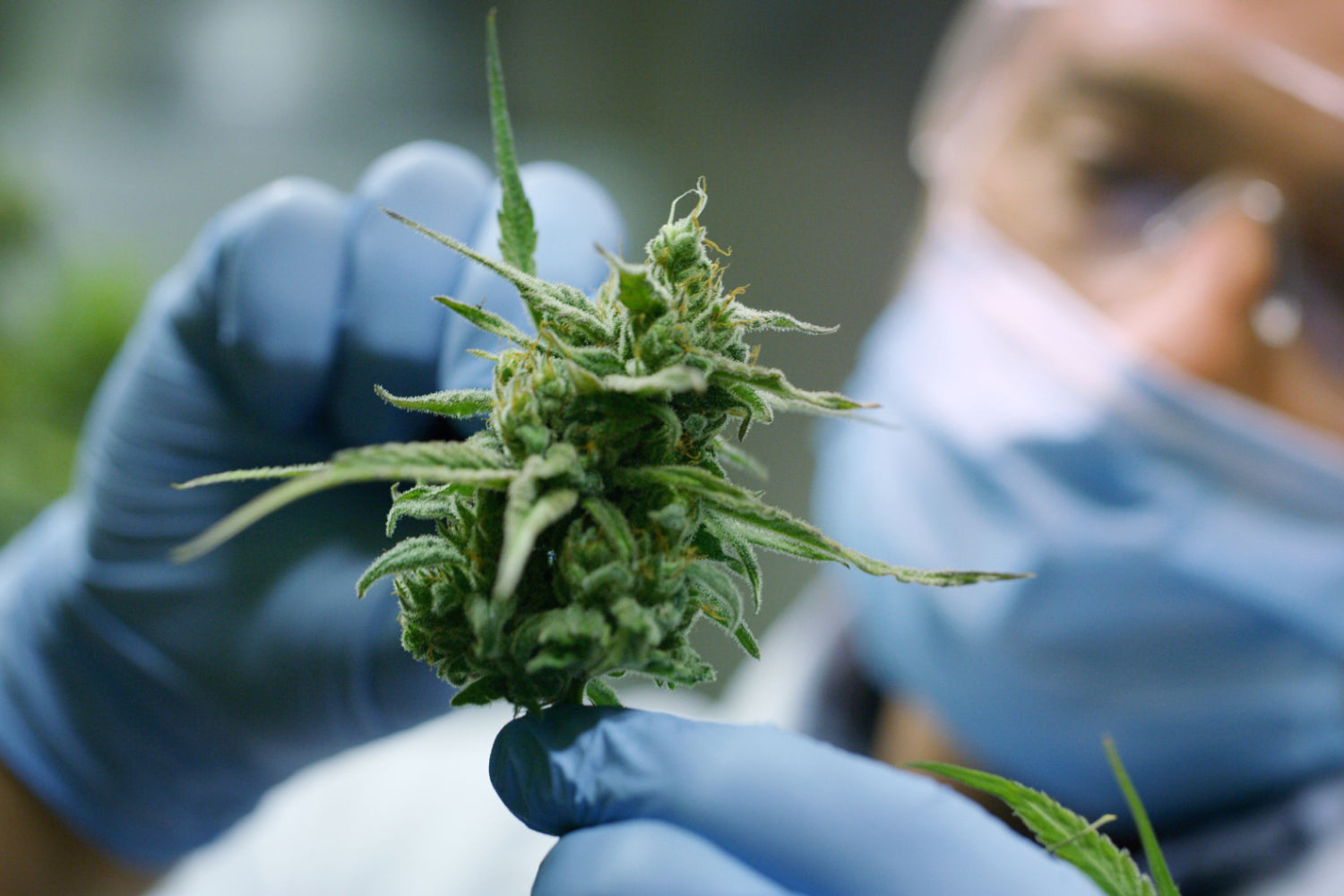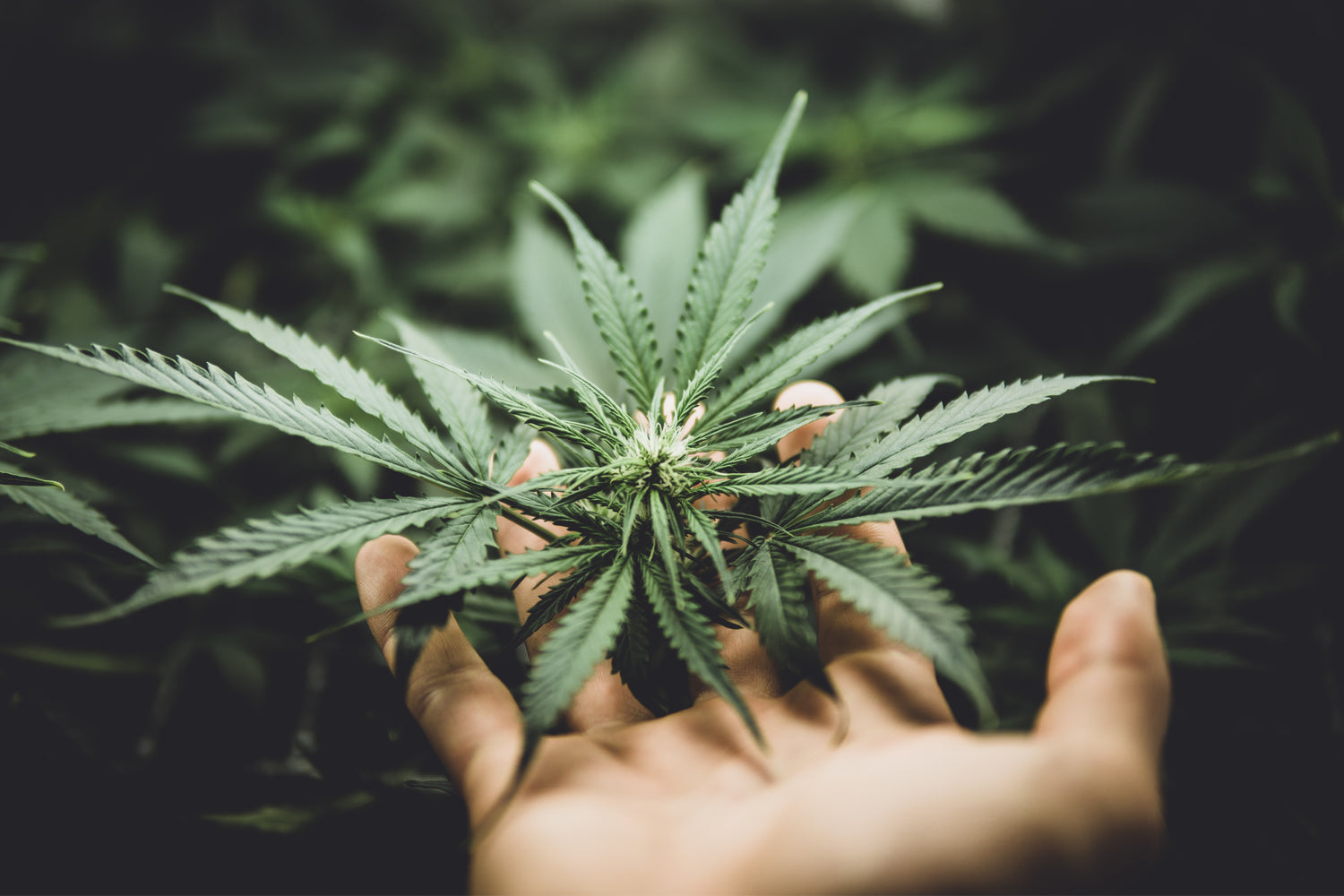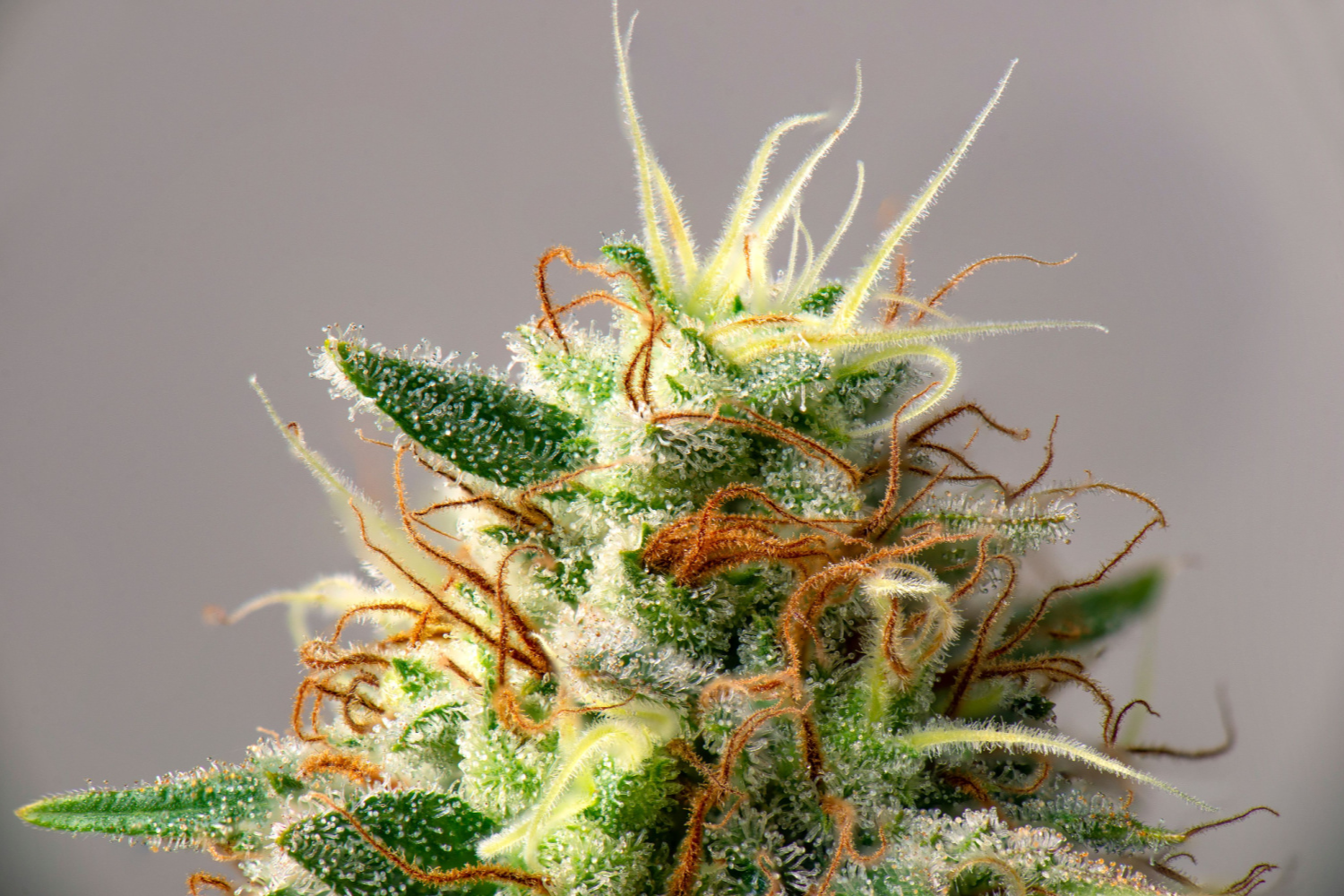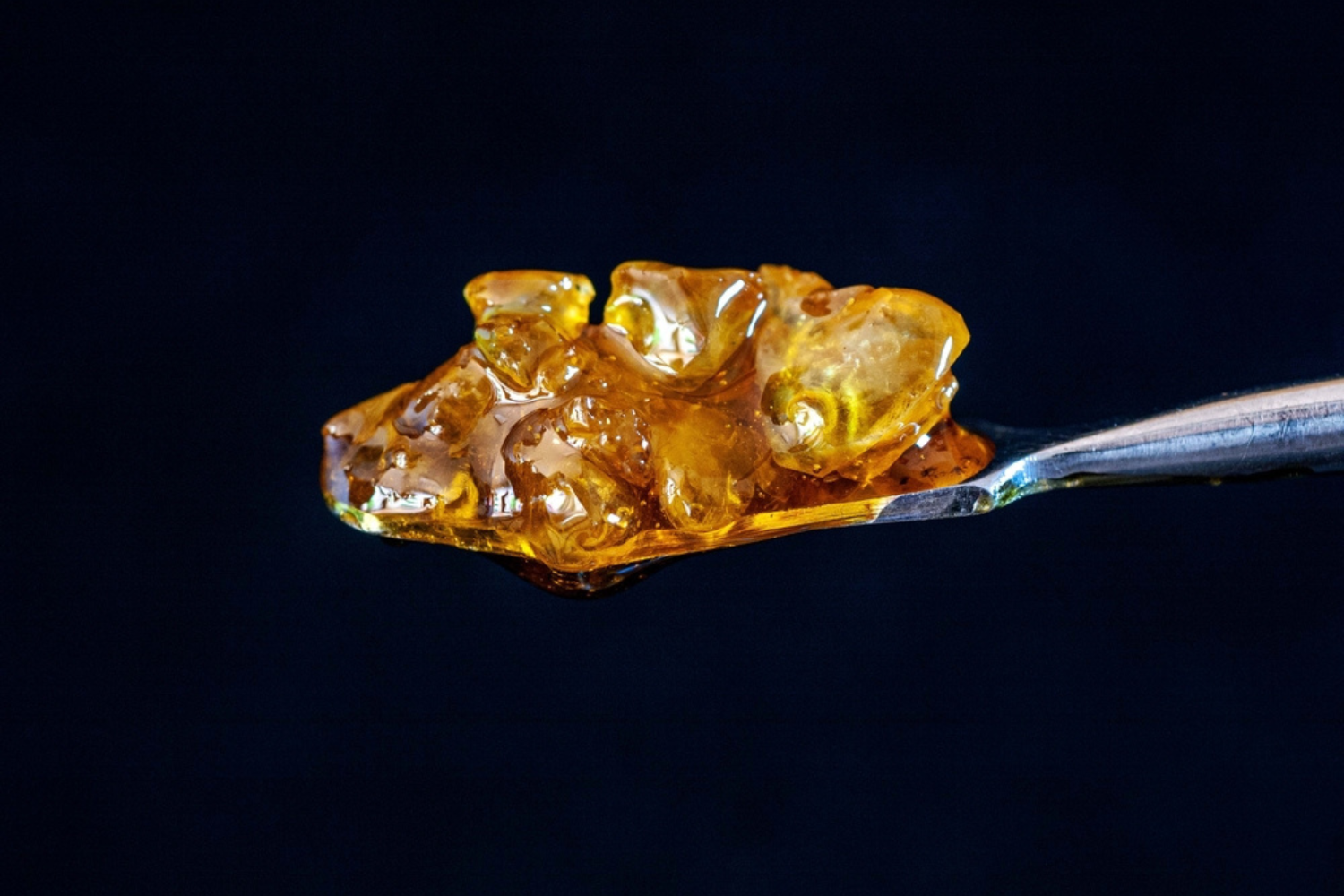Tetrahydrocannabinol (commonly called THC) is the most well-known cannabinoid that occurs naturally (and exclusively) in cannabis. Although research is still ongoing, it's been used since ancient times for a variety of illnesses and symptoms.
Today, we understand cannabis better than at any point in history. However, D8 is relatively new.
So what is delta-8 THC? What are the benefits and possible adverse events? How does it compare to conventional cannabis products? We'll answer these questions and more.
What is Delta-8 THC?
In short, delta-8 THC is a form of THC that is chemically similar to the more famous psychoactive compound, delta-9 THC. The difference is a matter of simple chemistry, as delta-8 has a different atomic structure.
THC has several carbon atoms arranged in a chain, with a single "double-bond" on one part of the structure. In THC's case, the double-bond consists of two pairs of electrons shared between two carbon atoms.
For delta-9, the "9" represents the ninth atom on the carbon chain. Therefore, delta-8 has its double-bond on the eighth atom.
This subtle difference, however, has a substantial impact on the way delta-8 interacts with our cannabinoid receptors. We'll get into that shortly.
Cannabis plants don't typically contain much delta-8 THC, but its increase in popularity prompted some hemp CBD vendors to cultivate delta-8 cannabis.
Most participants are familiar with delta-8 vape products, which arguably put delta-8 THC on the map. However, dried and cured delta-8 plant materials ("buds") are increasingly popular among conventional smokers.
Delta-8 extracts, on the other hand, require a complex chemical extraction process that could leave behind toxic chemicals, heavy metals, microbes, fungi, or other unwanted compounds. Never buy delta-8 vapes or similar items from convenience stores or vendors who don't third-party test their products.
Will Delta-8 THC Get You High?
Yes, delta-8 THC will get you high since THC is still the active ingredient. However, the level of intoxication is muted compared to delta-9. This difference is due to delta-8 THC's affinity for the CB1 endocannabinoid receptors located in the central nervous system.
While both delta-8 and delta-9 THC bind to those receptors, delta-8 binds more weakly than its much stronger counterpart. Consequently, the psychoactive effects are less intense.
Users report all the benefits of delta-9 with a substantially milder high. This characteristic sets delta-8 apart from conventional THC products.
Aside from offering some of the same benefits, delta-8 also eliminates many of D9's drawbacks. For instance, high delta-9 THC cannabis can potentially cause adverse events like anxiety, panic attacks, dizziness, nausea, confusion, fatigue, difficulty concentrating, and short-term memory loss.
Certain prescription medications could have similar adverse reactions further exacerbated by delta-9's significant potency.
Safety Concerns
Like with most cannabis plant products, delta-8 has come under the microscope of the FDA for its potential impact on community health.
Since the products hit the market, poison control centers have reported instances of delta-8 THC poisoning, specifically among children who get access to delta-8 THC edibles or similar hemp products.
Also, like CBD, it's not hard to come across delta-8 products in gas stations and other less-than-reputable retailers. Unfortunately, the low quality and potential contaminants could lead to adverse effects, further concerning public health officials.
Again, buy delta-8 THC from reputable vendors with proven testing procedures. Additionally, cannabis dispensaries in legal states often carry these products, which are subject to set stronger regulations.
How Delta-8 THC is Made
To understand how hemp-derived delta-8 THC is made, we need to discuss isomers. An isomer is a compound with identical molecular properties but arranged differently (again, this brings us back to the double-bond).
Because delta-8 and delta-9 share the same atoms with a slightly different arrangement, delta-8 is classified as an isomer of delta-9 THC.
However, non-legal states can't use delta-9 to synthesize delta-8 (for obvious reasons). In this case, hemp supplement vendors turn to CBD.
Unlike delta-9, which is a natural isomer, CBD requires a bit of coaxing to effectively become delta-8 THC. Known as "isomerization," this technique can convert CBD into delta-8 THC. The method allows products to use high-CBD hemp rather than "marijuana" to extract and infuse delta-8 into vapes, edibles, and other products.
Delta-8 flower is also made through infusion. Manufacturers take a high-CBD flower and coat it with the delta-8 extract.
That being said, CBD isomerization is much "dirtier" than CBD or delta-9 THC extraction. It relies on strong, toxic chemicals that can be harmful if ingested or inhaled. This is why we keep stressing the importance of doing your research and sticking with vendors who employ third-party testing.
Delta-8 THC Feeling
Delta-8 THC is the perfect way to integrate medical cannabis into your daily routine. However, the actual effects vary depending on several factors, such as other cannabinoids and terpenes, potency, tolerance, and more.
Universally, however, the delta-8 THC feeling is less intoxicating than delta-9. Thanks to this latest cannabinoid innovation, health enthusiasts everywhere use delta-8 THC products for chronic pain relief, nausea, sleep, and more. However, more research is needed to confirm whether these claims can be scientifically proven. As always, consult with a medical care professional before trying delta-8.
To better explore the delta-8 THC feeling, let's look at the many participants who gave their feedback on delta-9's milder counterpart.
Research on the Delta-8 THC Feeling
Although delta-8 is relatively new, there's already been preliminary research thanks to the product's popularity. A joint research project between the University of Michigan, the University of Buffalo, and a CBD manufacturer examined the delta-8 THC feeling.
The research team gathered survey data from 500 individuals to see how they experienced delta-8 THC products. According to the follow-up article:
"The words of one user best describe the overarching views shared by survey participants: that delta-8-THC is like delta-9’s “nicer younger sibling” because it provides all the benefits with fewer adverse reactions."
User Experiences
As is expected for cannabinoid supplements and related products, users had varying experiences with delta-8 THC. However, unlike delta-9, delta-8 feedback has been overwhelmingly positive.
Unlike CBD, delta-8 THC offers many of the same potential benefits as delta-9 while still allowing consumers to remain functional. This eliminates concerns like poor job performance from THC intoxication and other adverse side effects.
Nonetheless, people describe the THC feeling in many different ways.
For instance, Reddit user "weedabo" says:
"It’s [delta-8] not exactly but can be most closely described as a body high with a clear mind but it effects everyone differently that’s just how it effects me when vaped, orally there’s a lot more foggy mind."
Another Reddit poster named "gdsmithx" chimed in, adding:
"Perhaps the best thing about it is that almost everyone, including me, reports a noticeable lack of anxiety and paranoia. It's very nice."
Meanwhile, "MixedMartialSmoke" gave an excellent summary, explaining:
"In low doses for me it’s a strong stimulant. I can’t help but stand up after 1 hit. 2-5 hits I’m out the door for a walk or run. More than that you start to get into that Stoney headspace. For me the best part of this is the excellence of the sound of music. The worst part if I had to pick might be the coughing. When there’s distillate stuck to your throat or lungs, that’s gotta get cleared with water or something. That’s vaping. For ingestion by tincture or edible there’s no negatives I can think of."
As we can see, feedback is all over the map. However, user reviews involve few complaints.
How Much THC is in Delta-8?
Delta-8 is a form of THC, so from a chemical standpoint, they're the same compound (again, with a slight structural difference). However, some may use "THC" and "delta-9 THC" interchangeably.
Like CBD, full-spectrum delta-8 products contain THC. However, to comply with the 2018 Farm Bill, no delta-8 or its derivatives contain less than 0.3% delta-9 THC.
Does Delta-8 Have THC?
Full-spectrum delta-8 products will contain up to 0.3% delta-9 THC. However, purified distillates are extracts that are stripped of everything except delta-8. These THC products won't contain delta-9 or any additional cannabinoid compounds.
Delta-8 THC vs. Delta-9 THC
Delta-8 THC products and delta-9 THC share some similarities and significant differences. Interestingly, many of their differences and similarities overlap. Let's take a quick look at what those contrasts are.
Similarities
Since delta-8 and delta-9 are both versions of tetrahydrocannabinol, it's unsurprising that they have a few things in common.
Source
Although delta-8 is commonly associated with "hemp" and delta-9 with "marijuana," both terms refer to the cannabis Sativa L. plant species. We'll cover more of that shortly.
Mechanism of Action
The endocannabinoid system (ECS) is the key that unlocks our ability to experience the health benefits of cannabinoids. It consists of two receptor groups: CB1 and CB2. The CB1 receptors are located primarily in the brain and spinal cord, while the CB2 are more numerous and spread throughout the peripheral, digestive, immune, and musculoskeletal systems.
Delta-8 and delta-9 THC bind to both receptors, letting users experience a brain and body "high."
Products
Both forms of THC are available in the same types of products. These include:
-
Dried flower
-
Vapes
-
Edibles
-
Oil tinctures
-
Concentrates/dabs (resin, rosin, BHO, etc.)
-
Topicals
Differences
Source
If cannabis is illegal in your state, then delta-8 THC products have been sourced from the "hemp" cannabis chemotype. As we mentioned earlier, both are versions of the same plant species. However, having less than 0.3% delta-9 THC allows producers to sell their products while remaining 2018 Farm Bill compliant.
Delta-9, on the other hand, is usually sourced from "marijuana" - another unscientific term used for legal classification - containing over 0.3% THC.
Production
While delta-8 THC products are isomers artificially generated from CBD, delta-9 THC concentrates don't require isomerization.
Mechanism of Action
Despite being almost identical to delta-9, delta-8 generates weaker psychotropic effects. So, how does delta-8 cause a substantially muted high compared to its stronger counterpart?
The answer lies in THC's affinity for the CB1 receptors we discussed earlier. Again, both bind to that receptor. However, delta-8's ability to bind with the CB1 pathway is weaker than delta-9's. Consequently, it's impossible for delta-8 to generate a level of intoxication on par with delta-9.
How Do I Take Delta-8?
Earlier, we listed the available delta-8 products. There's no right or wrong option. The consumption method you choose is entirely up to your health behavior and needs.
Edibles
Edible cannabinoid products have been a huge hit for quite some time. These products are perfect for people who want slow, sustained effects over the course of roughly eight hours. The lack of smoking also makes edibles considerably safer than inhaled cannabis.
However, edibles can take 30 minutes to three hours for full effect, making them impractical for immediate relief.
Oils
Cannabis tinctures have been popular for thousands of years, with the earliest recorded medical use dating back to around 2737 B.C. in ancient China. Today, however, these products are more refined and better understood.
Oils work similarly to edibles. However, because users place the product under the tongue for 60-90 seconds, this allows some of the cannabinoids to enter the bloodstream through the cheeks and gums.
As a result, oil starts taking effect within 30 to 45 minutes, peaking once fully digested and processed in the gut.
Vapes
Concentrate vapes are popular for several reasons. First, they're discreet. Of all the inhalation methods, vape oils require discreet, simple, cheap equipment and generate less odor than dry herb vaporizers or joints.
Vapes also offer the advantage of instant effects, making them ideal for quick relief. However, the drawback is that these effects only last about two hours compared to the greater longevity of edibles.
Topicals
Topicals are set apart from other methods as their purpose isn't meant for generalized effects, nor will they make you feel intoxicated.
Instead, topicals offer fast, localized relief when applied to an affected area, such as the knee, shoulder, or neck. Many users report excellent analgesic and anti-inflammatory effects from topicals.
Can You Smoke Delta-8 THC?
Yes, you can smoke delta-8 THC. A common choice for delta-9 users, delta-8 dried flower is now readily available from many hemp supplement vendors.
Smoking is advantageous because of its instant effects. But unlike vape oils, which (when produced safely) are equally effective, smoking can cause more lung irritation and expose you to toxic chemicals in smoke.
Although there's no evidence suggesting that cannabis can lead to emphysema, COPD, lung cancer, or other tobacco-related diseases, it can still reduce your lungs' ability to fight infection.
Is Delta-8 Legal?
Delta-8 THC is illegal in some states. However, a May 2022 ruling by the California Federal Appeals Court (roughly one month following the writing of this article) determined that delta-8 products are legal on the federal level, falling under the protection of the 2018 Farm Bill. As a result, these THC isomers aren't considered Schedule I controlled substances on the federal level.
Still, public health concerns over delta-8 THC led some states to ban it entirely. As of June 2022, the following places don't allow delta-8:
-
Alaska
-
Colorado
-
Delaware
-
Idaho
-
Iowa
-
Montana
-
New York
-
Nevada
-
North Dakota
-
Oregon
-
Rhode Island
-
Vermont
-
Utah
-
Washington
Ironically, some of these states legalized recreational cannabis.
Does Delta-8 THC Show Up On A Drug Test?
Yes, delta-8 will make you test positive on a drug screen. The difference between delta-8 and delta-9 is structural, not chemical (like CBD vs. THC). Consequently, tests won't distinguish between the two THC isomers.
How Long Does Delta-8 THC Stay In Your System?
Delta-8 stays in your system for two to 30 days, according to the Center for Forensic Science of Drug Rehabilitation and Recovery (CFAH). This broad range depends on a variety of factors, including:
-
Frequency of use and dosage
-
Tolerance
-
Age
-
Metabolism
-
Consumption method (inhaled products take longer to clear the body)
-
Potential drug interactions which affect the speed of metabolism in the liver
Is Delta-8 THC Safe?
Yes, delta-8 THC is safe - when produced properly. Since the CBD isomerization process requires toxic chemicals, it goes without saying that by-products from poor manufacturing can have catastrophic health consequences.
As long as the supplier is transparent, with publicly available third-party tests, you can confidently and safely purchase delta-8 THC products.
What are the Side Effects of Delta-8 THC?
The side effects of delta-8 are comparable to delta-9, including:
-
Drowsiness
-
Dizziness
-
Mild intoxication
-
Increased appetite
-
Short-term memory issues
-
Nausea
-
Anxiety
-
Paranoia
These effects may contradict the narrative that delta-8 is milder than delta-9. However, it's important to understand that these products are unregulated and could contain more delta-9 (or other unwanted compounds) than is advertised on the label.
Additionally, everyone's body responds differently to THC. Some individuals don't tolerate the substance, regardless of where the double-bond is located.
Conclusion: What is Delta-8 THC?
Delta-8 THC is an innovative product, to say the least. Bridging the gap between the non-psychoactive CBD and highly intoxicating delta-9, D8 is the perfect solution for those hoping for pain relief, appetite improvement, relaxation, and more.
However, the product isn't without risks. Lack of regulation has public health officials worried since customers have to trust vendors to self-regulate. But a reputable vendor that tests their products is the best source for safe cannabis extracts.
Whether delt-8 is right for you depends on your needs. Hopefully, future research will give us an idea of exactly what this product can do.






